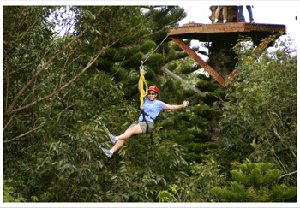Application for zip lines approved
 |
| An advernturer enjoys a zipline ride at a course in Hawaii. |
"For more than 100 years," she wrote in her application, "zip lines have been used to transport people and goods over rivers and challenging terrain. In the last ten to twenty years, zip line/canopy tours have become popular tourist destinations."
Her initial proposal, to bring guests to the property by a 12-person shuttle van via Christmas Lane, met with strong opposition from area residents, who cited increased damage to an already sub-standard private road as well as the impacts on privacy, but Robbe agreed and county commissioners stipulated as a condition that all business traffic use Grizzly Gap Road, which has fewer residents, to access the property. One person in the audience cited concerns that potential guests would use her physical address, which is on Christmas Lane, to find the site, but Robbe said the address would not be used in promotions.
"I don't want people running around the neighborhood, either," she said. "We're going to pick people up in either Naples or Bonners Ferry, drive them to the property, and they'll be supervised while they're there."
"Will they be blindfolded for the trip in?!" he asked, earning a laugh.
The permit allows Robbe to begin construction and the certification process for up to eight zip lines, which will traverse a canyon that runs through the property.
Put simply, a zip line is a pulley suspended on a cable anchored at two ends at an incline. Starting at the high end, you hook the package you want to transport (in this case adventurous people), and gravity does the rest.
"Zip lines use no electricity, emit no fumes, burn no fossil fuels or significantly impact the environment," Robbe said.
While it sounds simple, what Robbe is proposing is a little more complex. Her course will be inspected and certified by the Professional Ropes Course Association and will be designed by Derek Green, forner tour operations manager at Big Islands Eco-Adventure in Hawaii and a world-renowned course designer. Local arborist Mike Richardson will work with him, and the project will be overseen by a licensed engineer.
As planned, the initial wheelchair accessible course will consist of seven to eight ziplines averaging 600 feet, each having take off and landing platforms approximately eight-feet by eight feet in size, using frame/log construction. The zip lines themselves will be 1/2-inch galvanized aircraft cable and pulleys, braking systems and anchors will meet or exceed industry standards. A small lodge will be built to serve as a base camp.
Natural and local materials will be used for construction, she said, and local builders will be contracted to build the course.
"Care will be taken to ensure that the course is not visible from Highway 95," she wrote, "and designed to keep noise levels to a minimum. It will be inevitable that some will let out an excited 'Yahoo!'"
Once in operation, she plans to offer two tours per day, four days per week, through the summer season. For each 12 guests, there will be two guides, each licensed by the Idaho Outfitters and Guides Licensing Board. Tours will last 2 1/2 to three hours, to include time for transportation in and out, safety orientation and riding the zip lines.